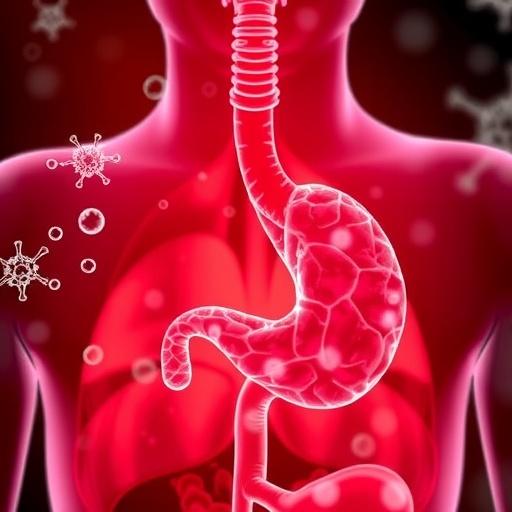A groundbreaking cohort study published in JAMA Oncology has unveiled a compelling link between the microorganisms residing in the human mouth and the development of pancreatic cancer. This investigation reveals that specific oral bacteria and fungal species are significant risk factors for this particularly aggressive and often fatal malignancy. The findings open a new frontier in cancer epidemiology and pathogenesis, signaling a potential shift in how researchers and clinicians approach pancreatic cancer prediction and prevention.
Pancreatic cancer remains one of the deadliest cancers globally, largely due to late-stage diagnosis and limited treatment options. Traditional risk factors, such as smoking, chronic pancreatitis, and family history, have offered some insight into at-risk populations but have proven insufficient to enable early detection. This study pioneers a novel hypothesis: that the ecosystem of microbes living in our oral cavity, collectively known as oral microbiota, might harbor invaluable clues to identifying individuals with heightened susceptibility to pancreatic cancer before clinical symptoms arise.
The oral microbiome is a complex, dynamic environment teeming with bacteria, fungi, viruses, and other microorganisms. While the role of these microorganisms in dental and systemic diseases has been acknowledged, their contribution to oncogenesis in distant organs like the pancreas has remained largely enigmatic. This study deploys advanced molecular techniques to profile the composition and abundance of these microbial communities in a large cohort, comparing those who developed pancreatic cancer with matched controls.
Methodologically, researchers utilized high-throughput sequencing technologies to analyze oral samples collected years before a pancreatic cancer diagnosis. By examining bacterial ribosomal RNA sequences alongside fungal DNA markers, the team was able to characterize the microbiota with unparalleled precision. The study revealed that certain bacterial genera, previously linked to chronic inflammatory states and carcinogenesis, were disproportionately represented in individuals who later developed pancreatic tumors. Similarly, fungal pathogens commonly known for mucosal infections were also significantly associated with increased cancer risk.
One of the most striking aspects of this research is its implication for biomarker development. Oral microbiota signatures, derived from relatively non-invasive sampling techniques like saliva collection, could soon emerge as powerful predictive markers for pancreatic cancer. This prospect holds promise for personalized medicine, where an individual’s microbiome profile may inform tailored preventive strategies, enabling interventions well before malignant transformation occurs.
Moreover, the study sheds light on potential mechanistic pathways underlying the connection between oral microbes and pancreatic carcinogenesis. Chronic inflammation induced by microbial dysbiosis could create a pro-tumorigenic environment, promoting genetic mutations and cellular transformations within the pancreas. Bacterial metabolites and fungal enzymes might also contribute to immunomodulation and tissue remodeling, further facilitating cancer progression. Such insights deepen our understanding of cancer etiology beyond genetic predispositions and environmental exposures.
Critically, the study was conducted within a robust epidemiological framework, employing longitudinal cohort design to mitigate biases and temporal ambiguities. The temporal dissociation between microbial profiling and cancer diagnosis strengthens the inference that microbial alterations precede and potentially contribute to pancreatic tumor development, rather than being a consequence of the disease or its treatment.
While these findings are promising, the authors caution that further validation in diverse populations and mechanistic investigations are essential to transition from association to causation. Future studies integrating metagenomics, metabolomics, and immunological assays will be key to unraveling the specific microbial-host interactions driving pancreatic oncogenesis.
Clinically, this research may revolutionize screening paradigms. Current screening methods for pancreatic cancer are invasive, costly, and not widely recommended for the general population due to low incidence and lack of reliable early detection tools. Integration of oral microbiome assessment could complement imaging and biomarker assays, enhancing sensitivity and specificity for high-risk groups.
Public health implications are equally significant. If causal links are confirmed, interventions aimed at modifying oral microbiota through antimicrobials, probiotics, or lifestyle modifications might emerge as innovative strategies to reduce pancreatic cancer incidence. Education on oral hygiene could gain renewed emphasis as a cancer prevention tool beyond its traditional role in dental health.
The corresponding authors, Dr. Jiyoung Ahn and Dr. Richard B. Hayes of NYU Langone Health, emphasize the transformative potential of the oral microbiome as a diagnostic and preventive frontier. Their contact details are made available for further scientific discourse and media inquiries, reflecting an eagerness to engage with broader research and healthcare communities.
This study underscores a rapidly expanding paradigm in oncology that recognizes the interplay between microbiology and cancer biology. Microbial ecology, once considered relevant primarily within gastrointestinal cancers, is now recognized as a systemic influencer with implications for diverse malignancies including pancreatic cancer.
As research progresses, the hope is that such microbial biomarkers will not only improve early detection but also inform novel therapeutic targets. Personalized microbial modulation could emerge as an adjunctive approach alongside chemotherapy, immunotherapy, and surgical interventions.
In summary, this seminal investigation delineates a clear association between oral microbial patterns and pancreatic cancer risk, laying the groundwork for a novel biomarker-based screening strategy. Through refined molecular analyses and rigorous epidemiological methods, the study heralds a new era in cancer prevention and diagnostics, shining a light on the microscopic world within us as a formidable ally against one of the deadliest cancers.
Subject of Research: Oral microbiota as risk factors and biomarkers for pancreatic cancer development
Article Title: Not explicitly provided
Keywords: Pancreatic cancer, bacterial infections, fungal infections, fungal pathogens, risk factors, biomarkers, disease prevention, cohort studies, microbiota, oncology




